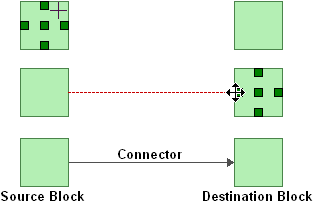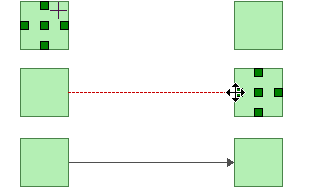

 |
Related Topics: | |
This topic discusses the most common techniques that you will use to build or modify a diagram, including:
For information about how to set the appearance of various diagram elements, see Diagram Appearance.
To add a standard block to a diagram, choose Diagram > Blocks > Add Block.
![]()
To add an annotation to a diagram, choose Diagram > Blocks > Add Annotation.
![]()
By default, the text "New Annotation" will appear in the annotation. You can change this text by double-clicking the annotation to open the Edit User-Defined Label window.
You also can cut or copy existing blocks (in the current diagram or in any other diagram of the same type) and paste them into the diagram using the Cut, Copy and Paste commands on the Home tab of the Ribbon. Blocks created in this manner will possess the same style and properties as the original block.
To select an individual block, click it. There are several ways to select multiple blocks:
Hold down the CTRL key and click the blocks.
Click in the diagram and drag the selection area to include the blocks you want to select.
Choose Home > Edit > Select All to select all blocks in the current diagram.
Click a block and then choose Diagram > Selection > Cascade Select to select all blocks that are connected to that block, either before it or after it.
The Rename Block window allows you to change the description of a block in the diagram. To access this window, select a block and then choose Diagram > Properties > Rename Block.
![]()
Enter the description in the input area, then click OK.
To create a connector between blocks, you can:
Choose Diagram > Settings > Connect Blocks.
![]()
Hold down the ALT key while selecting the source block and then drag a line to the destination block.
In both methods, the pointer will change to display small crosshairs. Click the source block, hold down the left mouse button and drag a line from the source block to the destination block. When the crosshairs are located above the destination block, release the mouse button to create a connector.

The location where the connector attaches to each block is determined by your selection in the Automatic Connection Preference field on the Connector Handles and Indicators page of the Diagram Style window. If the field is set to Left-Right, the connector will attach to the sides of the blocks; if it is set to Top-Bottom, the connector will attach to the top and bottom of the blocks. If No Preference is chosen, the connector will attach to the closest edges.
If you have selected Custom in the Bend Style field on the Connector page of the Diagram Style window, then when you are connecting blocks, five boxes will appear on each block that you point to. These boxes are connection points. You can click a connection point to use it as the location where the connector connects to the block. This allows you to draw connectors to and from any side of a block. The center connection point places the line using the default routing scheme, as defined in the Automatic Connection Preference field on the Connector Handles and Indicators page of the Diagram Style window.

Note that once you have added a connector that uses the Custom bend style, you can click the connector and drag the selected point to create a bend in the line. These custom bends can be removed by clicking the connector and choosing Diagram > Properties > Line Bend > Remove All Bend Points or, to remove a single bend point, by clicking the bend point and choosing Diagram > Properties > Line Bend > Remove Bend Point.
To stop adding connectors and return the pointer to its normal mode, release the ALT key or right-click the diagram or clear the Connect Blocks option by choosing the command again.
Tip: If you do not right-click the diagram or clear the Connect Blocks option to return the pointer to its normal mode, you will not be able to perform certain activities in RCM++, such as moving or deleting blocks. If you are experiencing difficulties with the software, make sure that the pointer is in its normal mode.
You can use the Format Painter tool to copy the block properties from one block and apply them to another block in the current diagram. To use, select the block with the properties that are to be copied and then choose Home > Clipboard > Format Painter.
![]()
The mouse pointer will turn into a pointing hand. Next, click the block to which the properties are to be applied. The properties of the source block will be applied to the destination block.
© 1992-2015. ReliaSoft Corporation. ALL RIGHTS RESERVED.